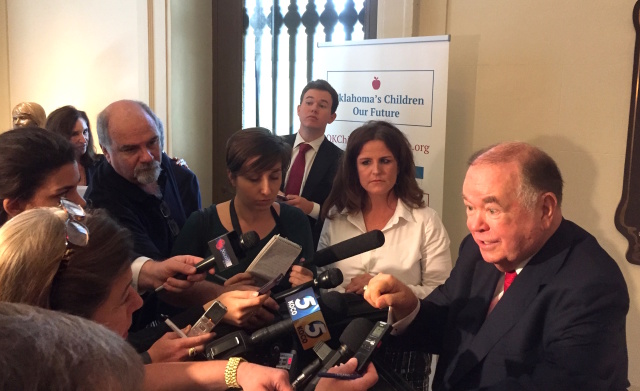At 74 years old, David Boren can still give a speech.
The OU president, former U.S. Senator and former governor gave a fiery one Wednesday to announce the Oklahoma’s Children — Our Future campaign, bellowing populist, inclusive rhetoric about education funding through the halls of the State Capitol.
“Oklahoma is not a place that just believes in equal opportunity for the affluent,” he said pounding on the podium. “Oklahoma is a place that believes in equal opportunity for everyone.”
NonDoc broke the news about this statewide initiative petition on Sept. 24 after learning about an email being circulated seeking support of it. The petition seeks to institute an additional $0.01 sales tax to fund education.
The language for the petition’s constitutional amendment — which will require 123,725 registered-voter signatures just to reach the ballot — was filed with the state following Wednesday’s press conference, and a press release handed to media listed 134 members of the effort’s “Statewide Supporting Committee.”
Members include billionaire philanthropist and oil mogul George Kaiser, musician Toby Keith, former OSU basketball coach Eddie Sutton, Heisman Trophy-winner Steve Owens, Chickasaw Nation Gov. Bill Anoatubby, Choctaw Nation Gov. Gary Batton and Olympic gymnast Bart Conner. The influential surnames Stephenson, Rainbolt and Schusterman also punctuate the list.
“Let the people vote!” Boren said at the end of his speech.
He also said it during the middle, and he left no one in the room wondering how important the issue is to him.
“He feels it,” said Phyllis Hudecki, a former state secretary of education under Gov. Mary Fallin. “He’s a leader. There will undoubtedly be pushback for a number of reasons. Some of it will be partisanship, but I hope not. He’s way past that.”
The executive director of the Oklahoma Business and Education Coalition, Hudecki recalled hearing noted Republican and OSU President Burns Hargis jokingly introduce Boren as “Oklahoma’s best Republican governor.” Hargis is also listed on the petition’s committee.
Hudecki spoke at Wednesday’s announcement, as did Anoatubby, 2016 Oklahoma teacher of the year Shawn Sheehan and former AT&T president and state secretary of commerce Dave Lopez. A student and a parent of Oklahoma public education students also spoke.
But Boren — flanked by bipartisan busts in the Hall of Governors — ran the show, introducing the speakers and picking up where they left off with grace and a natural handle of the moment. Only occasionally, he glanced at notes.
Asked afterward who taught him public speaking, Boren replied immediately.
“H.B. Mitchell, another teacher to whom I owe it all,” he said. “At Seminole High School, and the national debate trophy is named after him permanently because, in our little town, he produced more national champion debaters than any other debate teacher in the United States.
“I took debate from him. I have to tell you, when the U.S. Senate went on television for the first time and C-SPAN started covering it, I was terrified because I got a phone call from H.B. Mitchell — he was still alive — and he said, ‘I just want you to know I’ll be tuning in to C-SPAN to watch all your speeches and critique them for you.'”
Boren says he is acting as a private citizen
If Oklahoma voters ultimately pass the measure and add about $615 million annually to a state “Oklahoma Education Improvement Fund,” it will be owed heavily to Boren’s leadership on the topic. He reiterated Wednesday that he is pushing the effort as a private citizen and not a university president, but that’s a distinction likely lost on most people. It serves, primarily, to deflect conflict-of-interest criticism from potential opponents of the plan.
“I even put a private phone line in on my desk so that when I make calls on this, I use it and not the OU telephone,” he said. “And when people help me on it at OU, they take annual leave.”
Boren referred to the many teachers who influenced his life and wove the argument for higher teacher pay into the theme of better educational outcomes for students.
“What kind of state do we want?” he asked. “Are our kids worth a penny?”
Lopez addressed the subject from a business perspective, recalling the time he asked a prominent CEO to name the top three factors his company considers when looking to invest in a community.
The man answered “quality workforce” three times in a row.
“The magic happens between a teacher and her students,” Lopez said, arguing for the $5,000 teacher raises called for in the proposal. “There are no perfect solutions, but I haven’t found a better one than what’s in this initiative.”
The effort’s committee — which Boren said will continue to grow — features plenty of other prominent business names as well: Carl Edwards (president and CEO of the Oklahoma Business Roundtable), Cliff Hudson (CEO of Sonic Corp.), Tom Ward (former CEO of Sandridge Energy and founder of Tapstone Energy), Gene Rainbolt (BancFirst chairman) and others.
The Oklahoma’s Children — Our Future group will wait to see if its submitted ballot language is approved. If so, they will have 90 days to collect at least 123,725 valid signatures to place the measure on a statewide ballot. Boren said the group will shoot for 200,000 to be safe.
Oklahoma Watch’s Warren Vieth reported Oct. 1 that an independent estimate suggested the “average” Oklahoma family would pay $262 more annually to account for the proposed teacher raises, higher-education funding, early-childhood funding, innovation grants and other plan components.






















